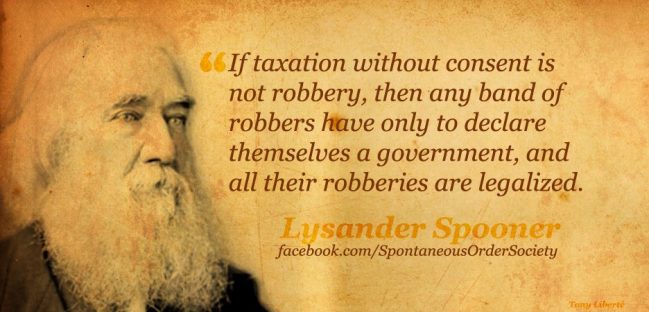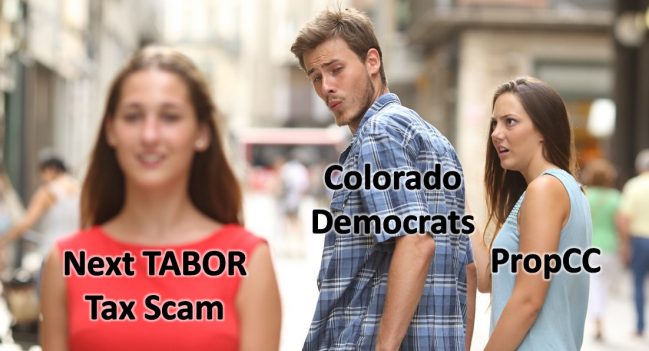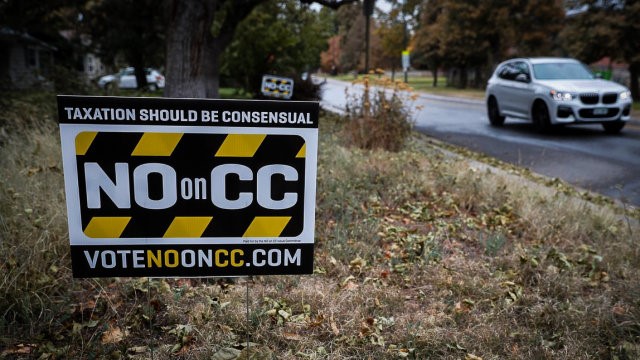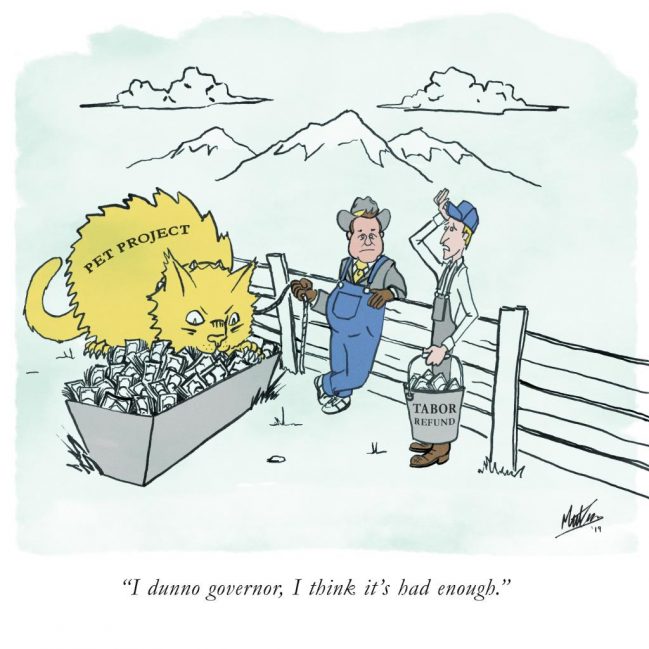
Category Archives: Editorial
OPINION | Family-leave ‘fee’ (spelled t-a-x) is another end-run on TABOR
It looks like @ColoradoDems in the #coleg are moving “full steam ahead” on state-sponsored #PaidFamilyLeave. But watch how they decide to fund it. They’ll prob create a new tax w/out #TABOR vote – & call it a FEE. My latest for @colo_politics
OPINION | Family-leave ‘fee’ (spelled t-a-x) is another end-run on TABOR
- Jimmy Sengenberger

There are a couple of federal government programs that have been around for decades. You might have heard of them: Social Security and Medicare.
You might also know that these programs are funded by payroll taxes. If you’re an employee working at a company, then the contribution is “split” 50/50 between you and your employer. Your portion is withheld and sent to the government each paycheck. If you’re self-employed, you must pay the full amount yourself. According to the IRS, the tax rates total 12.4% and 2.9% for social security and Medicare, respectively.
You’ll notice that the creators of these programs were clear they’d be funded with a payroll tax on both employees and employers. They didn’t play word games. They were upfront that every working American would be taxed a percentage of their income to support Social Security and Medicare.
Colorado Democrats are moving “full steam ahead” to create a new, statewide paid family leave (PFL) fund. This program would enable employees to receive “12 weeks of paid family leave for pregnancies, infant or sick relative care, or recovery from illness.”
The 2020 bill is still being written following input from a commission tasked with proposing ideas. But if the fund ends up being financed in a way that is similar to the 2019 version’s formula, it would involve a split — perhaps 60/40 — between employees and employers.
To read the rest of this story, please click (HERE):
If Taxation Without Consent Is Not Robbery, Then….

Natelson: Educating newcomers about Colorado values
Colorado’s economic prosperity is mostly a good thing, but it has a downside: Prosperity attracts newcomers ignorant of our state’s culture—and often unaware there is ![]()
anything to learn.
You can see it in the great outdoors. Colorado’s environment is different from those of most other states. Colo
rado has greater altitudes, steeper mountains, harsher sun, drier weather, sudden weather changes, and fierce temperature drops. Our environment, while stunning, is far less forgiving than most newcomers are used to. If you get into trouble . . . . well, as we used to say in the Colorado Mountain Club, “The mountains don’t care.”
For that reason the classic “ten essentials” of hiking—extra layers, extra water, a head covering, maps, good boots, sun screen, etc.—are even more important for Colorado than for most other places.
Yet visit any of our popular hiking areas and you’ll see the trails populated by people outfitted like they were strolling in a public park in Boston: no hats, no extra layers, little water, almost no provisions of any kind.
There’s No Such Thing As Government Funded. It’s All Taxpayer Funded

We could use your help, talents, and skills defending the gold standard, Colorado’s Taxpayer’s Bill of Rights (TABOR).

Now that Proposition CC has gone down in flames, what will progressives do next to sabotage TABOR?
Aren’t you sick and tired on politicians trying to weasel their way out of, or ignoring, TABOR?
We need to do something about it, right?
Well then, why not you?
Yes, you read that right.
Why not? It’s a great time to get involved.
If not you, then who?
We could use your help, talents, and skills defending the gold standard, Colorado’s Taxpayer’s Bill of Rights (TABOR).
We’re looking forward to having you help Colorado.
It’s easy to join.
See below on how you can make a difference.

Hope and Despond in Colorado
Voters stood up for tax refunds—but not charter schools.
By The Editorial Board
Nov. 6, 2019 7:05 pm ET
Opinion: Colorado Voters Stood Up for Tax Refunds

Proposition CC would have affected the Taxpayer Bill of Rights in Colorado. However, the measure failed at the polls on November 5, 2019. Image: David Zalubowski/Associated Press
They didn’t make the biggest headlines, but Tuesday’s elections in Colorado included two results that deserve national attention. First, a wide margin of voters refused to weaken the state’s Taxpayer Bill of Rights, a constitutional provision that prevents state tax collections from outpacing inflation plus population growth.
Voters approved TABOR, as it’s commonly called, in 1992. Since then it has delivered Coloradans about $3.5 billion in tax refunds, which are required whenever state revenue exceeds the calculated limit. But politicians, being politicians, would much prefer to spend the extra funds. Proposition CC would have eviscerated TABOR by allowing the state to put any revenue windfall into schools and roads.
A point of worry among fiscal conservatives was the ballot question’s wording, which began: “Without raising taxes . . . ” Perhaps this was strictly accurate, since no tax rates would have changed. But it was misleading in spirit, given that the proposition’s point was to let the state government keep more taxpayer money. Voters weren’t fooled. The measure failed, 45% to 55%, as of the tally Wednesday.
The Most Important Ballot Initiative of 2019
November 4, 2019 by Dan Mitchell
 Last November, voters in some states had the opportunity to accept or reject some very important initiatives, including votes on Colorado’s flat tax, Arizona’s school choice system, and a carbon tax in the state of Washington.
Last November, voters in some states had the opportunity to accept or reject some very important initiatives, including votes on Colorado’s flat tax, Arizona’s school choice system, and a carbon tax in the state of Washington.
Since 2019 is an off-year election, there aren’t as many initiatives and referendums. But one of them is vitally important. Politicians in Colorado are hoping voters will approve Proposition CC, which would gut the Taxpayer Bill of Rights (TABOR) and thus allow more government spending.
Why is TABOR worth defending? Because it’s far and away the most effective and well-designed fiscal rule in the United States.
It’s basically a spending cap, which is the ideal fiscal policy, and here’s a description of how it works that I shared last year.
Colorado voters adopted The Taxpayer’s Bill of Rights in 1992. TABOR allows government spending to grow each year at the rate of inflation-plus-population. Government can increase faster whenever voters consent. Likewise, tax rates can be increased whenever voters consent. …The Taxpayer’s Bill of Rights requires that excess government revenues be refunded to taxpayers, unless taxpayers vote to let the government keep the revenue.
Proposition CC doesn’t fully repeal TABOR, but it allows politicians to keep – and spend – excess tax revenues.
Norquist & Gleason: Fate our nation’s most important taxpayer protection measure hangs in the balance
The 2020 presidential campaign is dominating media coverage, but in just a few days, on Nov. 5, the voters (not a poll) of the battleground state of Colorado will determine the future of the nation’s strongest and most effective tax and expenditure limitation measure, known as the Taxpayer Bill of Rights (TABOR).
Approved by more than 53 percent of voters in 1992, Colorado’s TABOR mandates that state revenue cannot grow faster than the combined rate of inflation and population growth. State revenue collected in excess of the TABOR cap is refunded to taxpayers. TABOR also requires lawmakers to get voter approval for all tax increases.
It is projected that Colorado state government will have to refund roughly $500 million to Colorado taxpayers in 2020 due to revenue collections coming in above the TABOR cap. The progressive Democrats who run Colorado’s state legislature and Democratic Gov. Jared Polis are working to prevent those and all future refunds from happening with a measure referred to the November 2019 ballot that seeks to kill the Taxpayer Bill of Rights.
Proposition CC, which will appear on the statewide ballot in Colorado this fall, asks Colorado voters to allow state government to keep money that is supposed to be sent back to taxpayers in accordance with TABOR. Passage of Proposition CC would mean the end of the TABOR and the result would be a significantly higher tax burden in perpetuity for individuals, families, and employers across Colorado.
